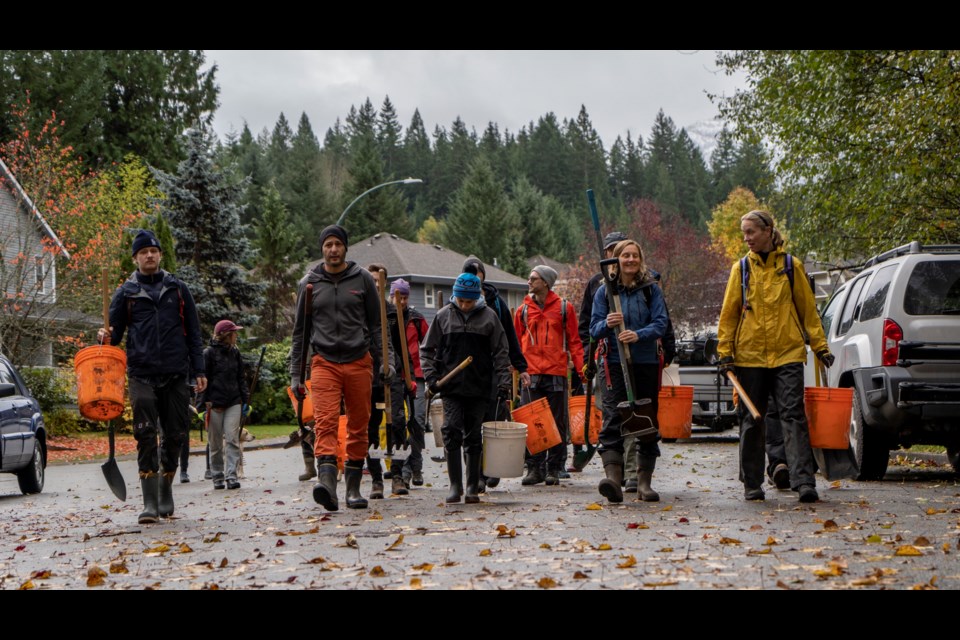One of the most prolific local trail-building organizations is asking the province to be more transparent in how it prioritizes approval of new trail infrastructure projects.
The president of the Squamish Off-Road Cycling Association also said B.C. needs to improve its ability to process these applications because it's "important to continue to inspire the volunteer community that is so important to our outdoor recreation culture in the Sea to Sky."
Jeffrey Norman said the province depends on SORCA and other volunteers to build and maintain most of the outdoor recreation infrastructure in Squamish.
"This is a big ask," wrote Norman in an email to The Chief. "For some projects, like trail building, there is a ton of enthusiasm for the community to help. However, without a clear path to an approval in a reasonable time frame, many individuals simply ignore the process."
Other infrastructure, such as parking lots, require considerable funding, yet it still often takes more than a year for the province to even open an application, he said.
As one example, Norman said that SORCA has been getting community feedback and making preparations for expanding the existing parking lot at the bottom of Pseudo Tsuga, which is in the Diamond Head area.
This process has taken almost five years, he said, and SORCA submitted an application more than 18 months ago.
"It is just finally getting some traction now," said Norman.
"At this point, the official referrals to stakeholders have been sent out. The province will make their decision on approval based on the feedback they receive."
Meanwhile, provincewide, outdoor recreation advocates are calling out the B.C. government for failing to adequately fund an agency responsible for overseeing the upkeep of more than 1,000 recreation sites and 20,000 kilometres of trails across the province.
With 50 staff and an $8-million operating budget, Recreation Sites and Trails BC has "fallen under the radar" of government priorities, according to Louise Pedersen, executive director of the Outdoor Recreation Council of B.C.
"It's just not enough," said Pedersen. "We wish they could speak up for themselves, but for some reason, they seem to have been forgotten for decades."
Pedersen added that funding shortfalls have prevented the agency's staff from participating in land use and recreational planning that would help ensure B.C. has a "world-class network of recreation sites and trails."
Recreation Sites and Trails BC has a mandate to provide quality recreation experiences on Crown land outside of provincial parks, First Nation reserves and local municipalities.
A spokesperson for the Ministry of Forests, Lands, Natural Resource Operations and Rural Development, which oversees the agency, said it would be "premature to speak to plans on increasing funding," citing the ongoing provincial budget process.
Indirectly, ORCBC says it represents more than 100,000 British Columbians who use the huge network of trails and recreation areas to hike, ride horseback, mountain bike, nordic ski and snowmobile, among other activities.
Last year, the B.C. government allocated $83 million over three years to bolster infrastructure in BC Parks. But none of that money has filtered down to recreation areas outside of parks, where 85% of the province's land base is found.
Pedersen says her group was among several outdoor recreation advocates that took part in the 2022 budget consultation process last September.
When the Select Standing Committee on Finance and Government Services came back with its recommendations in November, it said the government should provide increased funding, not just for parks, but for "recreation and trails to address gaps in maintenance and staff, including dedicated funding to community-based organizations for trail maintenance and development."
Pedersen says that long-standing capacity challenges mean many recreation groups are facing long delays in getting approval to rehabilitate trails. Hearing their recommendations echoed by the budget committee was "hugely reassuring," she added.
But as the 2022 budget negotiations continue, Pedersen says British Columbians that care about outdoor recreation need to remind their MLAs of their long-standing blind spots at a time when the ongoing COVID-19 pandemic is driving more people outdoors than ever.
Pedersen says trail counters in the Sea to Sky region, for example, recorded a 150% increase in traffic in 2019 and 2020. Other regions across the province report similar increases over the past two years.



